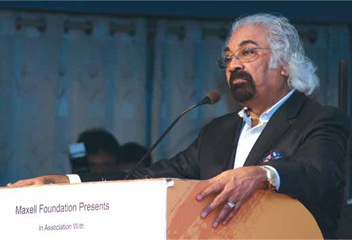
I want to take you through a journey through technology. I was born in 1942, almost 75 years ago, in a small tribal village called Titilagarh in Odisha. My parents were educated till the 4th standard only. In our village, there was nothing. No schools, no hospitals and no doctors. My father had migrated from Gujarat to Odisha in search of work. My mother delivered eight kids without any medical assistance. Fortunately, all the kids turned out to be mentally and physically healthy. As a kid growing up in that village, I could never imagine that one day I would see the technological advancements that are present today.
In those days, we used to journey in bullock carts. The train was considered a miraculous advancement in that era. I still remember the look of wide-eyed wonderment on my face when I first saw a train. When electricity finally arrived in my village, I had already left Odisha for Gujarat. There I saw the wonders electricity could do for humanity. While growing up we used lanterns at night. The electric bulb felt no less than magic when I first saw it. When the radio came for the first time in our house, the only thing you could listen to was radio static, as there was no reception. As kids, we found joy even listening to this static whistle. Later we got an antenna and then we could listen to the radio. It still feels surreal, thinking of the first time I heard a voice on the radio.
These experiences started my fascination with Physics, and I studied physics as opposed to the more conventional engineering. I always liked mathematics. One fine day, I read in the newspaper that US President John F Kennedy has decided to send man on the moon. I couldn’t believe it. I read this and decided in my youthful naivety that I must go to the US for higher education. I had no money or means to go there. I begged and borrowed money from acquaintances and took a boat from Mumbai which went from Karachi to Aden, from the Suez Canal to Naples and then onto Geneva. I took a train from Geneva to London, and then took a plane from London to New York, and then a bus from New York to Chicago. I reached there in the cold winter in 1964. This was the first time I saw snow in my life, and the experience was enthralling. One of the first things I noticed upon reaching there was doorknobs. I had never seen one before. I had seen only latches on doors in India. The doorknob seemed like cutting edge innovation to me. In fact, every simple thing I saw there was an innovation to me; mailboxes, cars and telephones. I had never made a telephone call in my life. In those days, there were very few telephones in India and those who did have one, were too rich to be my friends, so calling anyone was out of the question.
When the radio came for the first time in our house, the only thing you could listen to was radio static as there was no reception. As kids, we found joy even listening to this static whistle

When I saw the first phone in the US, I felt like a kid with a new toy. I felt the same on seeing a television set. As a technician, I knew how to design one, but had never seen one in person before. This curiosity of a little boy from India grew tenfold once I got to America. Everywhere I looked, I saw an opportunity to invent. Technology is all about problem solving. A lot of people think it is exotic, fancy, urban, elitist and sexy. But at its heart, technology is simple. It is about identifying a problem and solving it. Unfortunately, almost all important technologies in the last 50 years have come from the USA. When I say this to my friends from Japan, Europe, or India, they feel offended. But it is true. There have been only a handful of breakthrough inventions in the last century. The transistor, invented in 1947, TVs, phones, and many more. DNA, which led to biotech and genetic research, was also discovered there. The transistor fixed our exterior problems. DNA helped heal us internally. All these inventions came from the West.
I went to the USA to get a PhD in Physics. I found out it took seven years to get a doctorate in that subject. I went to my professors and told them I have a girlfriend in India and I don't think I can spare seven years. What could I get in one year? They recommended that I go for a degree in electrical engineering. I got the degree in nine months, and I got a job in Telecom. I didn’t know what telecom meant then. Ignorance is a great asset. Never let it go. Too much knowledge is scary sometimes. Once on a trip to India 15 years later, I tried to make a call to my wife from New Delhi, but the call couldn't get through. I got irritated and arrogantly thought I would solve this. I met Indira Gandhi and told her that I would fix India's telecom problem. If I had known the challenges I would face then, I wouldn't have been so eager. Not knowing something can be an advantage sometimes.
Once on a trip to India, I tried to make a call to my wife from New Delhi, but the call couldn’t get through. I got irritated and arrogantly thought I would solve this. I met Indira Gandhi and told her that I would fix India’s telecom problem. If I had known the challenges I would face then, I wouldn’t have been so eager. Not knowing something can be an advantage sometimes
The best thing was that, this task gave me purpose. I had made a fair bit of money by then and money didn't interest me. I grew up in a Gandhian environment. I went to a Gandhian school and Bapu was a role model while growing up.
All over the world, the best minds are trying to solve the problems of the rich who don't have so many problems to solve anyway. No one is bothered about the problems of the poor. The problems of the poor are very complex. I started my journey on Telecom in India. I worked with Rajiv Gandhi for a decade and that was the best time of my life. When we talk about Digital India today, everyone thinks it’s a new idea, but it started in the Rajiv Gandhi era. The formation of the National Informatics Centre (NIC) was the digital revolution of those days. Collecting data for every district was a new thing then. Today people think of Polio as an extinct disease, but I know the hard work that went into producing the Polio vaccine in India. I went to Russia and France to get the technology and Rajiv Gandhi agreed to invest $300 Million into the project. It took us 25 years of hard work for us to finally eradicate Polio.
When people say nothing happened in India over the last 60 years, they have no idea. When we gained independence, we had nothing. We were robbed by our masters. Our founding fathers had the vision to build laboratories, agriculture research, IITs and IIMs. They had the foresight to build institutions. Things don't happen overnight. We wouldn’t have been the superpower that we are today without those institutions. Unfortunately, people don’t' remember these things. If Rajiv Gandhi were alive today, India would be a lot more different.
I have always said that the challenge is to lift 40 crore people out of poverty in India, not to create more billionaires. American democracy is based on consumption and capitalism. Indian democracy is the great equaliser. The challenge is to use technology for the greater good.
Technology doesn’t differentiate. Ideas are borderless. It is fear that stops us from embracing this. We need to overcome this fear. This is the best time in the history of mankind to be alive; we just need to open up to the idea of being connected to everyone else
When I started in Telecom in India, there were 20 lakh telephone connections and there was a 15 year waiting period to get a new connection. Today, in a short span of 25 years, we have one billion connections and everyone is connected. I get too much credit for this. In reality, I was merely an instrument to achieve this change. It took coordinated efforts and serious political will of Rajiv Gandhi to achieve this result.
After independence, the world thought India would not be able to feed herself; that India was a basket case. Today, India not only feeds 1.2 billion people but we have surplus food. Unfortunately 20 crore people still go hungry, but the reasons for that are not shortage of food. The reason is that we haven't used technology and logistics to get that food to the ones who need it the most.
Recently, in Bengaluru I visited a laboratory where in a government funded lab, people are growing skin. If your hand is burnt, they can help you regenerate skin using genetic research. This is the real achievement of India. It is not cricket, Bollywood, or social media, which drives India. It is what goes on in these labs which will create a new India. It is the progress at ISRO (Indian Space Research Organisation) which will define India. The sad reality is that those people will never be recognised or get the credit for their work. India’s real achievement is the sacrifice these people make for their country.
For the first time in the history of mankind, the world is connected through technology. What does this connectivity means? No one understands. Mankind is connected but people aren’t celebrating it. Today, when I see the world turning towards populism and protectionism, including in India, I see this as a knee jerk to change. They feel threatened, and they use patriotism as prejudice. Technology doesn’t differentiate. Ideas are borderless. It is fear that stops us from embracing this. We need to overcome this fear. This is the best time in the history of mankind to be alive; we just need to open up to the idea of being connected to everyone else.
by Sam Pitroda